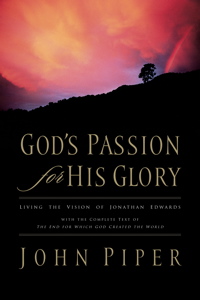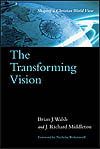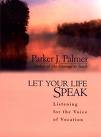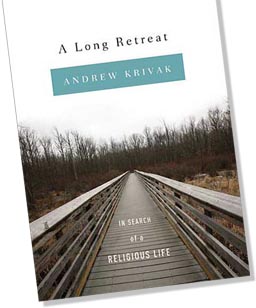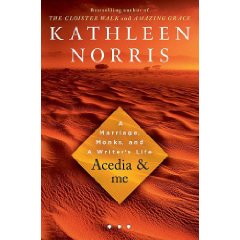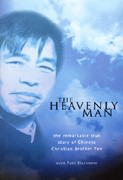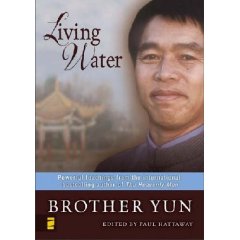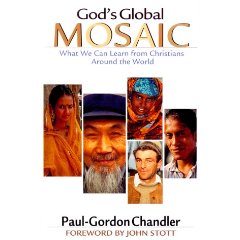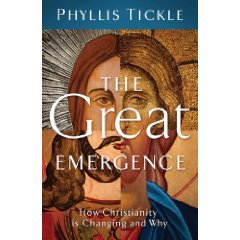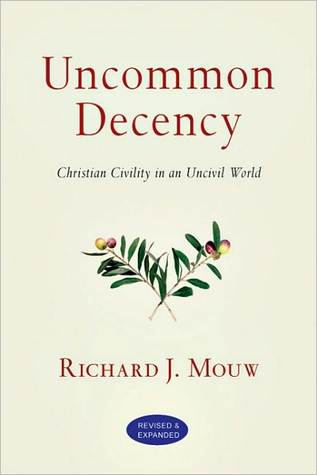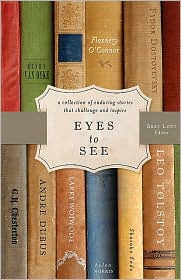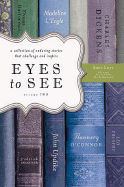I hope my reviews and announcements here encourage you in your commitments to reading, and that perhaps they inspire some to organize book groups or a small group study of some sort. These kind of low-risk, informal social initiatives can only strengthen communities, bond folks together around the struggle for new ideas, and, hopefully, honor God as people of faith grapple with ideas found on the printed page. The great revival preacher and social reformer John Wesley, you probably know, gave rise to the movement known as “Methodism” which got its name from his method of disciple-making: reading groups! Wesley was very widely read and quite the Oxford bookman, but his method for groups was simple: read the Bible and good books and pray. Not a bad method, if you ask me.
And, as an aside, it is fabulous that Shane Claiborne, author of The Irresistible Revolution and Jesus for President, the dread-locked poster boy for radical social activism, has a great new book with his old Eastern College pal Jonathan Wilson-Hartgrave, which draws on the early saints and medieval mystics, rooting social action in deep spirituality. It is called Becoming the Answer to Our Prayers: Prayer for Ordinary Radicals (IVP; $13.) They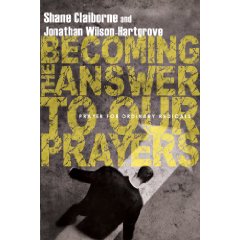 didn’t learn this stuff—and offer these amazing sidebars of quotes and prayers—just by googling ancient prayer, or snooping the local big box bookstore, but by being together, doing small group stuff, exploring books together, and being in relationships with others around these important ideas. Young Baptist evangelicals like Shane & Jonathan don’t just start citing Dorothy Day and William Stringfellow, let alone Gregory of Nyssa and Saint Benedict out of nowhere; somebody passed those books to them! They read as they worked, prayed as they protested, learned from traditions other than their own. Congrats to the IVP Likewise imprint for putting out this kind of stuff, spreading the good news around, helping us read widely. Would I be too blunt to say you should “go and do likewise”?
didn’t learn this stuff—and offer these amazing sidebars of quotes and prayers—just by googling ancient prayer, or snooping the local big box bookstore, but by being together, doing small group stuff, exploring books together, and being in relationships with others around these important ideas. Young Baptist evangelicals like Shane & Jonathan don’t just start citing Dorothy Day and William Stringfellow, let alone Gregory of Nyssa and Saint Benedict out of nowhere; somebody passed those books to them! They read as they worked, prayed as they protested, learned from traditions other than their own. Congrats to the IVP Likewise imprint for putting out this kind of stuff, spreading the good news around, helping us read widely. Would I be too blunt to say you should “go and do likewise”?
In recent posts I’ve mentioned some important books for the journey towards increasing cultural responsibility, social engagement and Christian views of civic life. Maybe you don’t want to read a big book on Christian political persepctives or dive deep into foundational studies just now. Well, how about small group stuff? How about DVD?
Here are some very, very useful tools that are thoughtful but brief and arranged for small group use. Maybe they’d be just the resource you could pick up to pull together a group this month. Email or call us today and we can ship ’em right out!
 Christianity Today Study Series (Current Issues Bible Studies) Politics (Nelson) $9.99 They’ve taken some of the best articles about faith and politics from CT in recent years and added great discussion questions, sidebars and solid Bible study. The first essay is a thoughtful and important framing one, written by our friend James Skillen (of the Center for Public Justice.) Other authors include Dave Gushee, Stephen Carter, Timothy George, Andy Crouch, Richard Kauffman (now of The Christian Century), Nancy Pearcey, William Willimon and a large handful of other men and women. It is arranged in 8 weeks (although you could skip some, if you wanted) and I could imagine spending more than one session on some of the chapters.
Christianity Today Study Series (Current Issues Bible Studies) Politics (Nelson) $9.99 They’ve taken some of the best articles about faith and politics from CT in recent years and added great discussion questions, sidebars and solid Bible study. The first essay is a thoughtful and important framing one, written by our friend James Skillen (of the Center for Public Justice.) Other authors include Dave Gushee, Stephen Carter, Timothy George, Andy Crouch, Richard Kauffman (now of The Christian Century), Nancy Pearcey, William Willimon and a large handful of other men and women. It is arranged in 8 weeks (although you could skip some, if you wanted) and I could imagine spending more than one session on some of the chapters.
We have their other new studies, too, Faith & Work, Engaging the Culture and one on Islam. Excellent.
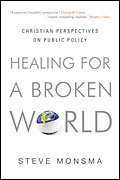 DVD Healing for a Broken World: Christian Perspectives on Public Policy Stephen Monsma (Henry Institute/Crossway) $24.95 I’ve raved about the book, which explores four Biblical principles and then applies those principles in a balanced manner to an array of contemporary issues. This well-crafted and content-heavy DVD has interviews with fabulous folks—Jennifer Butler, Rich Mouw, Richard Czik, John Dilulio and others—and is ideal for a small group that wants to hear some brief insights, follow along as a small group of young adults discuss the content. Obviously, you then enter in with your own conversations of consequence. 12 Sessions. Highly, highly recommended, especially in this election season.
DVD Healing for a Broken World: Christian Perspectives on Public Policy Stephen Monsma (Henry Institute/Crossway) $24.95 I’ve raved about the book, which explores four Biblical principles and then applies those principles in a balanced manner to an array of contemporary issues. This well-crafted and content-heavy DVD has interviews with fabulous folks—Jennifer Butler, Rich Mouw, Richard Czik, John Dilulio and others—and is ideal for a small group that wants to hear some brief insights, follow along as a small group of young adults discuss the content. Obviously, you then enter in with your own conversations of consequence. 12 Sessions. Highly, highly recommended, especially in this election season.
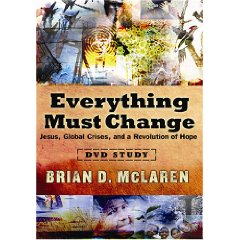 DVD Everything Must Change: Jesus, Global Crisis and a Revolution of Hope Brian McLaren (Nelson) $39.99 This is a bit edgy in style, creative and interesting, as Brian lectures, ever so briefly but with very compelling insight, about the major themes of his important book and recent tour. There are clever pull out quotes and drop in interviews and a small bit of footage from the tour. From our ideological idolatries to our deepest questions and yearnings, this relates the framing narrative of the gospel and how a Christian vision might help respond to the great global challanges of our day. A great study booklet guides you through 8 strong sessions.
DVD Everything Must Change: Jesus, Global Crisis and a Revolution of Hope Brian McLaren (Nelson) $39.99 This is a bit edgy in style, creative and interesting, as Brian lectures, ever so briefly but with very compelling insight, about the major themes of his important book and recent tour. There are clever pull out quotes and drop in interviews and a small bit of footage from the tour. From our ideological idolatries to our deepest questions and yearnings, this relates the framing narrative of the gospel and how a Christian vision might help respond to the great global challanges of our day. A great study booklet guides you through 8 strong sessions.

